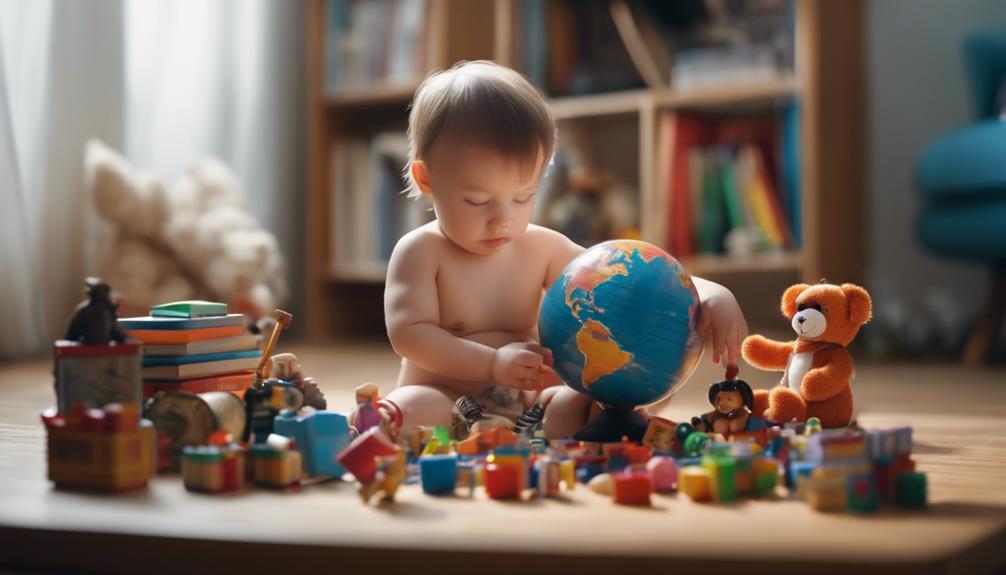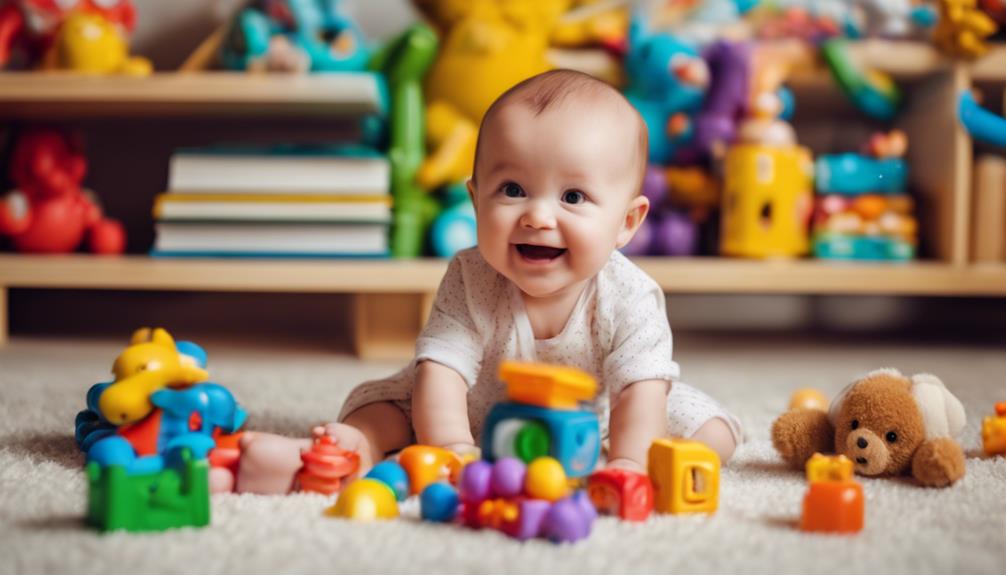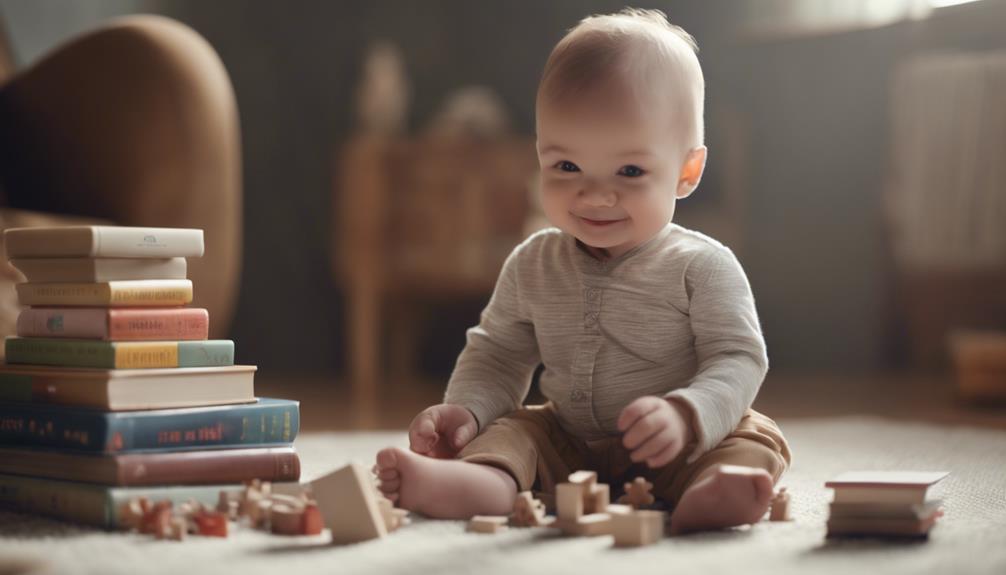Discover whether your baby may possess exceptional potential with important indicators. Look out for signs such as advanced motor skills, early language development, and exceptional memory. Additionally, pay attention to curiosity, quick learning, and sensory sensitivity. Social skills and a preference for older companions could also be indicative. Engaging in creative play, problem-solving, and showing interest in artistic activities are signals of creativity. By fostering these traits, you can help further develop their abilities. Keep an eye out for these qualities to gain a deeper understanding of your baby’s potential.
Key Takeaways
- Exceptional alertness, curiosity, and advanced motor skills.
- Early language development, vocabulary milestones, and memory retention.
- Innovative play choices, problem-solving abilities, and critical thinking skills.
- Enhanced cognitive abilities, quick problem-solving, and cognitive flexibility.
- Strong reaction to stimuli, sensory sensitivity, and creativity indicators.
Exceptional Alertness
If your baby exhibits exceptional alertness, they may quickly recognize and bond with family members. High alertness in newborns can lead to early eye contact, which is an important social cue indicating an infant's interest and connection with those around them.
When babies show exceptional alertness, they tend to be more responsive to their surroundings, displaying curiosity and a keen awareness of the environment. This heightened awareness can be an early indicator of potential high intelligence in infants.
Creating a calm and soothing environment is essential to help maintain alertness in babies. By providing a peaceful atmosphere, you can support your baby in staying attentive and engaged with the world around them.
Alert babies often exhibit behaviors such as smiling, cooing, and waving, all of which stem from their heightened alertness and interest in interacting with their caregivers and surroundings. This early development of social skills can pave the way for strong bonds and communication as your baby grows.
Advanced Motor Skills

Babies displaying advanced motor skills typically demonstrate exceptional physical abilities, indicating potential cognitive strengths. These infants may exhibit remarkable physical dexterity and coordination far beyond their age group. From sitting up unassisted at 3-4 months to crawling and standing earlier than their peers, their fine motor skills shine through as they pick up small objects with precision and manipulate toys effectively. Their preference for activities requiring coordination hints at their advanced abilities. The early development of advanced motor skills often signifies quicker physical growth and potentially higher cognitive capabilities. Check out the table below for a quick overview of the key points related to advanced motor skills in babies.
| Key Points | Description |
|---|---|
| Early Sitting Abilities | Babies may sit up unassisted at 3-4 months old, showing exceptional balance. |
| Fine Motor Skills | Precise handling of small objects and effective manipulation of toys. |
| Coordination Skills | Demonstrating exceptional coordination in activities like crawling early. |
Early Language Development

If your baby is reaching vocabulary milestones early and demonstrating strong language comprehension skills, they may be showing signs of advanced language development.
Hearing multiple languages and attempting to speak at an early age are indicators of high intelligence in infants.
Encouraging your baby to mimic sounds and interact with words can help boost their language skills and foster a love for communication.
Vocabulary Milestones
Developing a rich vocabulary in early childhood is a key indicator of intelligence in infants. Early vocabulary milestones, such as mimicking sounds and attempting to talk, are linked to high intelligence in babies. Some infants may even start forming clear sentences as early as 10 months old, showcasing advanced language skills. Enjoying listening to books being read aloud and trying to communicate verbally are signs of a baby's potential high IQ. Regular exposure to words and early attempts at forming them are crucial for language development and can indicate intelligence in infants. Hearing multiple languages and delighting in mimicking sounds can further enhance language skills and potentially point towards high intelligence in babies.
| Vocabulary Milestones | High Intelligence Indicators |
|---|---|
| Mimicking sounds | Forming clear sentences early on |
| Trying to talk | Enjoying listening to books being read |
| Attempting to speak | Regular interaction with words |
Language Comprehension Skills
Advanced language comprehension skills in infants can be observed through their early attempts at forming words and mimicking sounds as young as 6-10 months old. Babies with strong language comprehension skills often display an interest in listening to stories being read aloud and may start communicating through sounds and gestures early on. As part of early language development, infants showing a curiosity in mimicking sounds tend to have enhanced language skills.
Furthermore, babies exposed to multiple languages from an early age and enjoying imitating different sounds are more likely to exhibit advanced language development.
Parents can encourage language comprehension skills by engaging in activities that involve storytelling, singing, and talking to their infants. Responding positively to a baby's attempts at communication, whether through babbling or gestures, can also support their language development. By fostering an environment rich in language stimuli, caregivers can help nurture and strengthen their baby's language comprehension skills, setting a solid foundation for future linguistic abilities.
Exceptional Memory
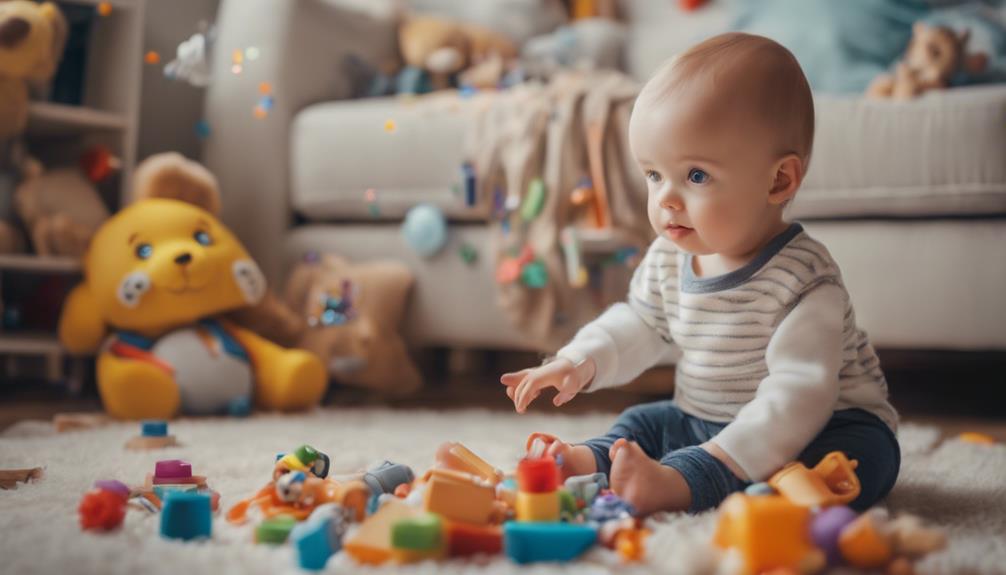
If your baby rapidly recalls information and effortlessly retains details, they might've an exceptional memory.
This ability to remember names, places, or objects from a young age could be a sign of advanced cognitive skills.
Demonstrating strong memory recall early on could indicate genius-level memory in your little one.
Rapidly Recalls Information
Exceptional memory in babies enables them to quickly recall information with precision and clarity. Babies with highly intelligent traits often exhibit rapid memory retention, showcasing advanced cognitive abilities.
These infants possess exceptional memory skills, allowing them to remember faces, events, or details from a remarkably young age. The ability to recall information swiftly signifies a giftedness that surpasses typical developmental milestones.
When a baby demonstrates the capacity to retain and retrieve information beyond their peers, it could indicate a high level of intelligence. Observing a baby who can rapidly recall information provides insight into their cognitive potential and may suggest giftedness.
Paying attention to these signs early on can help in nurturing and supporting the cognitive development of a baby who shows exceptional memory abilities.
Retains Details Effortlessly
Babies with exceptional memory effortlessly retain details, showcasing advanced cognitive abilities at a young age. This exceptional trait can be a strong indicator of high intelligence in your baby.
Here are some key signs to look out for:
- Recalling specific events or faces with ease.
- Recognizing familiar objects or people early on.
- Demonstrating quick learning capabilities by remembering past experiences.
- Exhibiting a remarkable ability to retain newly acquired information.
- Displaying advanced cognitive skills through exceptional memory retention.
These behaviors not only suggest your baby may possess exceptional memory but also hint at their potential for high intelligence.
If you notice your baby effortlessly retaining details and demonstrating exceptional memory skills, it could be a strong indication of their advanced cognitive abilities. Keep nurturing and stimulating their curious mind to support their intellectual growth and development.
Curiosity and Fast Learning
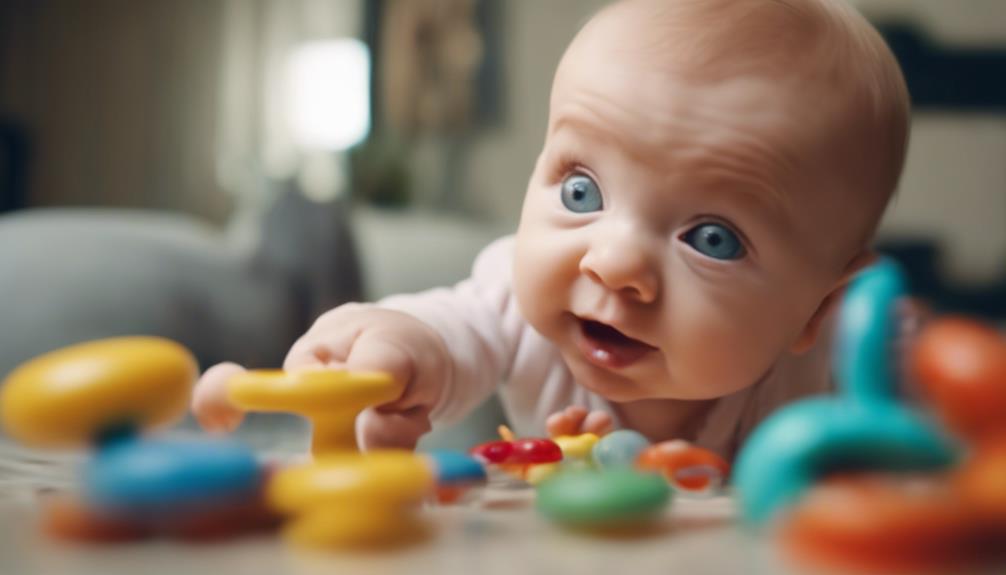
How can you identify if your baby is a genius based on their curiosity and fast learning abilities? Gifted babies often display an insatiable curiosity, constantly seeking out new information and experiences. Their fast learning skills allow them to absorb knowledge rapidly and retain it effectively, setting them apart from their peers. Intelligent babies exhibit a keen interest in learning, asking complex questions that challenge adults and delving deep into various subjects. These indicators of curiosity and fast learning are key traits seen in babies who show signs of giftedness.
| Indicator | Description |
|---|---|
| Curiosity | Gifted babies show a strong desire to explore different subjects thoroughly. |
| Fast Learning | They quickly grasp new information and retain it well. |
| Inquisitiveness | Intelligent babies ask complex questions that showcase their curiosity. |
| Exploration | Their constant seeking of new experiences highlights their thirst for knowledge. |
Problem-Solving Abilities
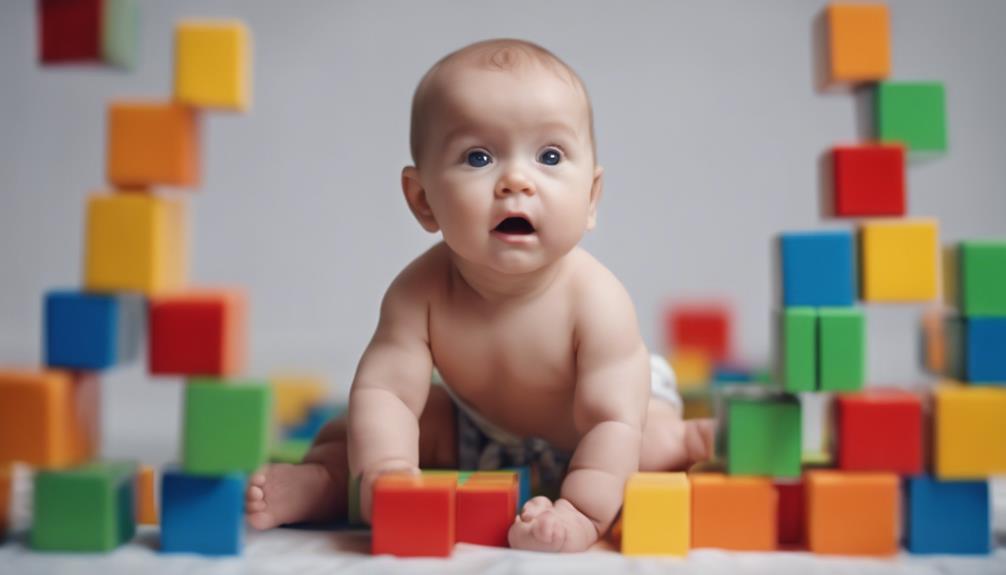
Intelligent babies often excel at quick puzzles solving, showcasing their exceptional problem-solving abilities. They tend to gravitate towards innovative play choices and exhibit adaptive toy preferences, all of which are strong indicators of high intelligence.
Encouraging these tendencies through interactive activities can further enhance their problem-solving skills and foster their intellectual development.
Quick Puzzles Solving
Mastering quick puzzle solving early on can be a strong indicator of your baby's advanced problem-solving abilities. Babies who excel in solving puzzles swiftly may possess high intelligence and demonstrate genius-level cognitive abilities.
Here are some key points to take into account:
- Quick puzzle solving showcases strong problem-solving skills in babies.
- Analyzing and resolving puzzles faster than peers can indicate advanced cognitive abilities.
- Cognitive flexibility and critical thinking are demonstrated through quick puzzle solving.
- Natural aptitude for problem-solving tasks at a young age can hint at potential genius-level intelligence.
- Engaging babies in puzzle-solving activities can further develop their problem-solving skills and cognitive abilities.
Encouraging your baby to tackle puzzles can be a fun way to nurture their intellect and foster their problem-solving prowess. Keep providing opportunities for your little one to engage in such activities to support their cognitive development.
Innovative Play Choices
To understand your baby's problem-solving abilities beyond quick puzzle solving, observe their innovative play choices for indicators of advanced cognitive skills. Innovative play choices, such as finding creative solutions to challenges and demonstrating strategic thinking, can suggest a higher level of problem-solving abilities in infants. By paying attention to how your baby approaches obstacles during playtime, you can gain valuable insights into their cognitive development.
Encouraging open-ended play opportunities can further nurture their problem-solving skills and cultivate a growth mindset from an early age. Babies who naturally exhibit a propensity for problem-solving may benefit from engaging with toys and activities that stimulate their critical thinking abilities. By fostering an environment that encourages innovative play choices and strategic thinking, you can support your baby's cognitive growth and development in a fun and interactive way.
Adaptive Toy Preferences
Look out for babies who display a preference for toys that challenge their problem-solving and critical thinking skills. These babies may exhibit advanced cognitive abilities that hint at potential genius-level intelligence. When observing your baby's toy preferences, consider the following indicators:
- Toys that require problem-solving: Babies who choose toys that involve solving puzzles or figuring out complex mechanisms might've heightened problem-solving skills.
- Preference for critical thinking toys: Babies showing interest in toys that stimulate critical thinking may be demonstrating advanced cognitive abilities.
- Toys promoting logical thinking: Look for babies drawn to toys that require logical thinking and strategic planning, as this may indicate a higher level of cognitive development.
- Interest in toys with creative solutions: Genius babies may excel in tasks that involve finding creative solutions, such as in mazes or intricate toy mechanisms.
- Toys stimulating cognitive development: Babies with advanced problem-solving abilities may naturally gravitate towards toys that challenge and stimulate their cognitive development.
Sensory Sensitivity

Enhance your understanding of your baby's potential intelligence by observing their sensory sensitivity cues closely. Babies with heightened sensory awareness often display advanced cognitive abilities from an early age. Pay attention to how your baby reacts to different smells, tastes, textures, sounds, and sights as these can provide valuable insights into their intellectual potential. A keen interest in exploring their environment through various sensory experiences is a positive indicator of heightened intelligence.
To help you better understand the link between sensory sensitivity and intelligence, let's explore some key indicators in the table below:
| Sensory Sensitivity Indicators | Potential Significance |
|---|---|
| Preference for multiple languages | Advanced cognitive abilities |
| Strong reaction to loud noises or bright lights | Heightened intelligence |
| Interest in exploring environment through touch, taste, and sound | Heightened sensory awareness |
| Enjoying listening to books being read aloud | Potential high IQ |
| Early exposure to diverse sensory stimuli | Advanced cognitive development |
Social and Emotional Skills

Understanding social and emotional skills is essential in recognizing your baby's potential intelligence. Highly intelligent children often exhibit unique traits that set them apart. Here are some key indicators to look out for in your baby:
- Happy Disposition: A baby with advanced cognitive abilities may show early happiness, laugh frequently, and have a generally cheerful demeanor.
- Problem-Solving Skills: Babies with high IQs tend to excel in problem-solving tasks, demonstrating a knack for finding solutions from a young age.
- Engaging Activities: A preference for engaging activities, such as music and exploration, can enhance social and emotional development in intelligent babies.
- Like-Minded Friendships: Highly intelligent children are often drawn to older companions and form friendships with peers who share similar interests.
- Curiosity: Intense curiosity is a common trait in intelligent babies, driving them to explore their surroundings and engage with new stimuli actively.
Preference for Older Companions

Highly intelligent babies often gravitate towards older companions for intellectual engagement and stimulation. If your baby shows a preference for older companions, it could be a strong indicator of advanced social and intellectual development.
Intelligent babies may seek out interactions with older individuals due to their interest in activities that provide intellectual stimulation. This interest in engaging with older peers can demonstrate a thirst for challenges and meaningful conversations, traits commonly found in highly intelligent infants.
Creativity and Imagination
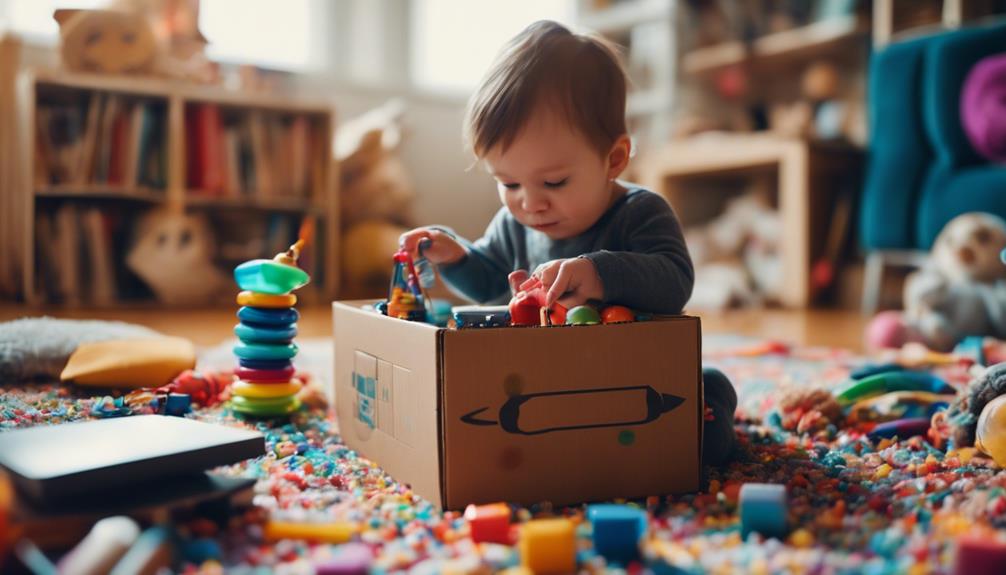
When considering your baby's potential for advanced social and intellectual development, exploring their creativity and imagination is essential. Gifted babies often display exceptional creativity and imagination from a young age, showcasing their ability to think outside the box and come up with innovative solutions. Here are some indicators to help you recognize these traits in your little one:
- Engaging in elaborate pretend play
- Creating intricate artwork
- Coming up with innovative solutions to problems
- Demonstrating unique storytelling skills
- Expressing original ideas through various mediums
Encouraging and nurturing your baby's creativity and imagination can help them thrive and reach their full potential. By providing opportunities for imaginative play, artistic expression, and problem-solving activities, you can support the development of these important skills in your gifted child. Remember, fostering creativity early on can pave the way for a bright and innovative future.
Frequently Asked Questions
How to Identify a High IQ Baby?
To identify a high IQ baby, watch for advanced problem-solving skills, early language development, exceptional alertness, curiosity, preference for solitude or playing with older children, and a happy, expressive disposition. These signs suggest high intelligence.
How to Tell if an Infant Is a Genius?
To tell if your infant is a genius, observe milestones like sitting up early, exceptional problem-solving skills, preference for independent play, asking complex questions, and slightly higher birth weight. These can indicate advanced cognitive abilities.
How Do I Know if My Baby Is Gifted or Just Smart?
You're wondering if your baby is gifted or just smart? Look for advanced problem-solving skills, exceptional alertness, and early language development. If you notice these signs, your little one might just be on the genius track!
Do Baby Milestones Indicate Intelligence?
Baby milestones like sitting up early and forming sentences quickly can indicate intelligence. Encourage communication skills through reading and talking. Celebrate achievements to support cognitive growth and track progress effectively. Praise milestone successes for enhanced development.
Conclusion
To sum up, if your baby displays exceptional alertness and advanced motor skills, early language development, exceptional memory, and curiosity, they may indeed be a genius in the making. Fast learning, sensory sensitivity, social and emotional skills, a preference for older companions, creativity, and imagination are also key indicators. Keep nurturing their abilities and providing them with opportunities to thrive.
Remember, every child is unique and develops at their own pace, so celebrate their individual strengths and talents. Stay tuned for more signs of genius potential!

